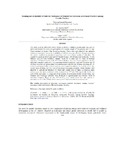| dc.contributor.author | Phamotse, I.T. | |
| dc.contributor.author | Nenty, H.J. | |
| dc.contributor.author | Odili, J.N. | |
| dc.date.accessioned | 2013-04-04T08:12:47Z | |
| dc.date.available | 2013-04-04T08:12:47Z | |
| dc.date.issued | 2011-11 | |
| dc.identifier.citation | Phamotse, I.T. et al (2011) Training and availability of skills for sustenance of standard in classroom assessment practices among Lesotho teachers, International Journal of Scientific Research in Education, Vol. 4, No. 3&4, pp. 190-201 | en_US |
| dc.identifier.issn | 1117-3259 | |
| dc.identifier.uri | http://hdl.handle.net/10311/1130 | |
| dc.description.abstract | The study used an inferential survey design in which a validated questionnaire was used to gather and analyze the views and perceptions of a random sample of 146 primary and 102 high school teachers at Qacha’s Nek district in Lesotho. These were with regard to the influence training in assessment has on the availability of skill to carry out effective classroom practices that sustain standards in educational assessment and hence enhance quality of education. The sample was made up of 119 male and 127 female teachers, 103 of theme with certificates 41 with diploma and 102 with bachelor’s degrees. Some 92 of them had 1-5 years of teaching experience, 57 had 6-10 years while 97 of them had above 10 years of such experience. Among them they attended a mean of 0.706 assessment-related workshops. The study involved the use of a face validated sic-option Likert-type questionnaire with two sets of items consisting of: (a) list of assessment skills to which teachers were required to indicate the level to which they possess each of them; a list of classroom assessment practices, which teachers were expected to indicate the frequency to which they applied each of them. A Cronbach alpha analysis gave the alpha coefficient of the instrument as 772 and 764 respectively for the two parts of the instrument. A composite of the number of assessment-related courses taken, and seminars and workshops attended were developed to operationalize each teacher’s level of assessment training. Based on this, 137 of them were found not to have any training in assessment at all, while 73 had a little training and 35 had some training in assessment. | en_US |
| dc.language.iso | en | en_US |
| dc.publisher | IJSRE, http://www.ijsre.com/ | en_US |
| dc.subject | Assessment in education | en_US |
| dc.subject | Assessment standard | en_US |
| dc.subject | Assessment training | en_US |
| dc.subject | Teacher's assessment skills and practices | en_US |
| dc.subject | Bloom taxonomy | en_US |
| dc.subject | Lesotho | en_US |
| dc.title | Training and availability of skills for sustenance of standard in classroom assessment practices among Lesotho teachers | en_US |
| dc.type | Published Article | en_US |
| dc.link | http://www.ijsre.com/Vol.,%204_3&4_-Phamotse.pdf | en_US |

